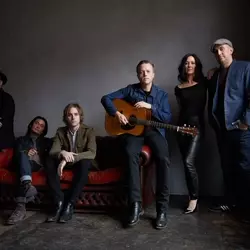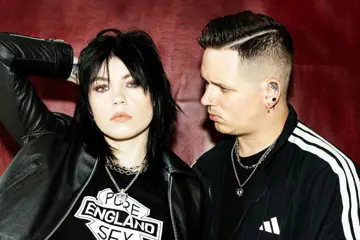 Jason Isbell & The 400 Unit
Jason Isbell & The 400 UnitSobriety seems to agree with Americana star Jason Isbell. The life he lives now since abandoning the bottle in 2012 is miles removed from his hedonistic younger years spent on the road with hard-living Southern rockers Drive-By Truckers and his own earliest solo forays with his band The 400 Unit, but the drastic change has paid handsome dividends in his art.
The album chronicling his life reversal, 2013’s Southeastern, proved to be his critical and commercial breakthrough, while his last two albums – Something More Than Free (2015) and The Nashville Sound (2017) – both debuted at number one on the Billboard rock and country charts and collected Isbell four Grammys between them.
Now as he’s on the verge of releasing his next statement, Reunions, the world has been reduced to chaos by the COVID-19 pandemic, Isbell isolated with his family at their home half-an-hour outside of Nashville, and any pressure he may have felt coinciding with the new album has been placed in immediate and stark context.
“We had a pretty bad run of tornadoes right before everybody went on lockdown, actually the last show that I played was a benefit show for tornadoes around Nashville,” he explains. “We had a lot of damage in the city – it missed our place but a lot of friends lost businesses and homes and a couple of counties in the surrounding areas had a lot of deaths, it was really rough. We didn’t have time to get everything cleaned up and situated before the virus came through, so it’s been really hard on a lot of folks, really hard.”
Don't miss a beat with our FREE daily newsletter
Despite this wake-up call Isbell is justifiably proud of Reunions, not just another typically strong batch of songs but one that’s been rendered perfectly in the studio with meticulous attention to detail paid by both the singer and his long-term studio cohort Dave Cobb.
“Yeah, we put more time and effort into the sound,” Isbell admits. “I wanted something that was more high-fidelity than anything we’ve done in the past, and to do that without reaching and without doing a disservice to the songs that’s the real challenge.
“We didn’t spend months on it or anything – I think we probably took about a month altogether to record and mix – but when it came to getting sounds and making things interesting sonically that’s where most of the work came in.
“Because I had most of the songs written before we got in the studio and the band is really quick – they don’t need much time to learn how to play the songs – so we would get the form and structure of the song down pretty quickly and spend most of our days working on trying to make things sound hi-fi and interesting.”
While not wanting to name names, Isbell is adamant that Reunions as a record gets closer sonically to the music he actually listens to than anything he’s done in the past.
“I think it’s a more accurate representation of how I want to sound,” he reflects. “I don’t want to steer anybody in any particular direction artist-wise – and I don’t want to say, ‘Hey, it sounds like this or it sounds like that’ – but I’ve been trying for a long time to write and record a record that just I guess suited my own tastes.
“And I think that’s the hardest thing to do for a lot of creative people: people confuse it sometimes for writer’s block but I think really when you get blocked you’re actually just having a hard time writing or creating to your own tastes.
“I grew up listening to a big combination of ‘80s pop music and old gospel and blues and country music and big arena rock bands, and I feel that we’ve sort of mixed all those things together in a way that makes a lot of sense.
“And it has sort of the spirit of R&B music that was made at home in Muscle Shoals without trying to copy any of that – I think I just finally got to a point where I can write songs that don’t make me cringe, in all honesty. It took a long time, it took a long time.”
Isbell remains firmly of the belief that while songwriting is a skill where you can get better at it the more you do it, there’s also an underlying complexity to the craft that’s more akin to a dark art.
“I think you get better but I also think it should get more challenging because as you do it and as you get better at it your standards should change,” he offers. “The things that I would have accepted as okay in a song ten or 20 years ago I won’t accept now, I’ll spend more time on each individual line, usually when it comes to phrasing and things like proper word choice and usage and eliminating cliché – unless I’m using them for a specific purpose – and narrative cohesion.
“You get finer and finer and finer in the details as you go along and I think that’s probably worked best for me, because it is harder for me now to write a song and be finished with it than it was 20 years ago, but the reason for that is because I just hold myself to a different standard than I used to.”
So it’s mainly about setting the bar a bit higher?
“Yeah it moves, you know, and I think that’s a part of challenging myself artistically,” he continues. “If I had stopped after Southeastern – stopped trying to improve and move forward – then I could of still made some good albums just coasting off that particular energy, but I don’t think I would have been satisfied.”
"I think I just finally got to a point where I can write songs that don’t make me cringe, in all honesty. It took a long time, it took a long time."
Isbell also admits to writing his songs with an eventual home in mind, even if he does start out allowing them to be birthed in isolation.
“Yeah, I have an album in mind,” he admits of his creative process. “I try not to go so far as a concept, so I try really hard to ignore themes until I have a lot written – if I get five or six songs then I might start allowing certain themes melodically or musically or lyrically to pop back up again, but I haven’t ever made an album with a very specific intention from the beginning.
“I usually just start writing the best songs that I can and then through that process I learn what is on my mind at that point of time, and once that becomes obvious then I just let myself talk about those things more in the songs that come later.”
There’s no pause when Isbell is asked about the patterns running through Reunions and what themes he may have inadvertently stumbled upon this time around.
“Well, there’s a lot of ghosts on the record,” he states emphatically. “Ghosts of people that I’ve known in my past and also of me in my past – I address fairly directly the person that I used to be, and I’m just starting to come to terms with how little I have changed. I got sober about eight years ago – a little over eight years ago – and I guess it’s always been a tool for me with my sobriety to think, ‘Man, you’re so much different from that guy’.
“But I’m getting to a phase now where I’m trying to come to terms with the fact that not everything I did in those days was detrimental to my health or to my work or to the happiness of people around me. I finally got to the stage where I think it’s safe for me to forgive that person, and that’s a pretty big reunion for me.”
With that in mind, is a song like It Gets Easier – a barrelling barroom stomp seeming to analyse his sobriety – written to himself or is he trying to share that journey with other people?
“That’s a good question, I think it’s both,” he ponders. “You start out trying to share that experience with other people but through the experience of the song you usually figure out you’re talking to yourself – in my experience anyway. When it’s done right, to avoid being preachy, it’s a good idea to talk to yourself more than anything else.
“And the songs sort of work in both ways – they connect with people and they get the message that you want to share out, and also they remind you of the things that you probably need to be reminded of.
“That song in particular, I’m going to go out – whenever we’re allowed to go out and play music and it’s safe again – I’m going to go out and sing that song hundreds of times, and during the course of singing that song I will really drill it into my head why I got sober and why I stayed sober and how it feels now as opposed to how I felt then.”
Another notable Reunions track, the beautiful Only Children, speaks personally about childhood friends that have since passed away but in a manner that’s directly relatable and completely universal.
“It’s autobiographical but it’s also a combination of different stories,” he smiles. “I like to do that within the narrative, I noticed that movies and books are put on the shelf by whether or not they’re true or fiction, and songs don’t work that way.
“If you’re looking for movies you have a section for documentaries or if you’re looking for a book there’s non-fiction and autobiography, but for songs they don’t delineate between the two, and I was always drawn to the idea that you can dance between the two in a song.
“That one started when I was in Greece with my wife and my best friend and his wife – he’s a writer for a magazine and an editor in New York – and he was reading his work to us and I was singing songs to him, and it just reminded me of a time when we were younger and you’d find yourself sitting around in a room with a group of people and playing songs for each other, and once you get in the professional world and do this as a career that doesn’t happen very often.
“It started off as a love song for that, and then the ghosts started appearing and the people who were in those rooms with me when I was 18-years-old some of them aren’t alive anymore and they started coming back into my consciousness, so I just let that happen and I just wrote about that.”
Conversely, Letting You Go – a paean to the daughter Isbell shares with his wife and bandmate Amanda Shires – is equally immediate but more about looking forward to the future rather than backwards over the shoulder.
“Right, yeah, I think you’re right and that is a strange thing for a song to do, skip forward all that time,” Isbell tells. “I was thinking last night about Pancho & Lefty – I think about that song by Townes Van Zandt a lot because it’s so good – and the tag at the end of that song, when he goes from saying “all the Federales say” to “a few grey Federales say” in the tag at the end of the song, you get decades that pass in the three seconds between that tag. And it’s just amazing to me that you can write that so clearly and so simply and it can be obvious that decades passed between the last chorus and the repetition of that line – so much time passes and it’s so brilliant.
“It’s a strange thing to flash forward like that but for Letting You Go I thought I could find the right place to take it, because that’s something that you do when you have a small child, you spend a of time flashing forward: what effect is this going to have on her in 20 years?”
Isbell’s marital relationship with Shires is itself explored in the songs Running With Our Eyes Closed and St Peter’s Autograph, but he explains that writing such songs is tough irrespective of whether your partner is in the band or not.
“I don’t know because I haven’t really done it any other way to tell you the truth, I don’t seem to get along too well with civilians in that situation,” he chuckles, referencing in passing his first marriage to Drive-By Truckers’ bassist Shonna Tucker. “But we kind of have a rule in our house that if a song is done right, then it stands. And if it’s not done right then it’s not done yet, and I think everything else sort of serves that.
“If I’m writing about my relationship with my wife – which I did on both of those songs – then as long as you get it right it’s fair game. I felt like I got it right, and I tried to come at romance from a different angle than the one you typically see because most of the time you hear about the beginning of a romance or the end of one, but you don’t really hear about the time in-between which is where most of us live and spend most of our lives, like five years, ten years or 15 years into a relationship.
“So I try to document that when I can because it gives me a different perspective, and also because there’s something honest about it to me. Because most of us are not in the process of falling in love or falling out of love or dying, most of us are in the process of trying to collaborate on our lives with somebody else.”
"If you’re looking for movies you have a section for documentaries or if you’re looking for a book there’s non-fiction and autobiography, but for songs they don’t delineate between the two, and I was always drawn to the idea that you can dance between the two in a song."
Despite some of these seemingly deep undercurrents flowing through Reunions, Isbell concurs that it’s above all a positive and uplifting listen.
“I think for me it’s probably pretty positive, yeah it’s a positive record for me,” he says. “I try to do things that remind myself and my audience that we’re resilient by nature, and I think the ultimate expression of positivity is that resilience: how much can we live through?
“A lot of times people hear my songs and they think they’re sad, but when you look a little bit deeper I think the fact that these characters are alive to tell these stories is really about as happy and as much as a reason to celebrate as anything.”
And it goes without saying that everybody on the planet right now acutely feels that need to dig deep and be resilient in the difficult current climate we’re facing together.
“No shit man, I know,” Isbell sighs. “Nobody saw this coming – maybe some folks did but a year ago nobody saw this coming – and I don’t think anybody, with the exception of a few countries who dealt with similar viruses a decade ago, was prepared for it.
“So nobody knows what’s going to happen next, it’s a really strange and really scary time.”
But fortunately it’s a time that can only be made better with the addition of beautiful art like Reunions, even if the circumstances surrounding its release feel completely surreal.
“It is [surreal], but it also kinda feels like it’s the best possible thing that I could be doing right now, putting out an album,” Isbell affirms. “Everything that I’ve done creatively it always seems to happen in a time of great personal change for me, and I think that’s when the best stories get told and I also think that’s when people need stories the most and they need music the most.
“So it feels like the charts are probably going to be weird and the tour’s going to be weird to get in place and the album sales are going to be strange and probably less than they have been in the past, but honestly I don’t really care much about that because I feel like I have an opportunity to give music to people at a time when they really need it. That’s way more important than old world considerations.”















